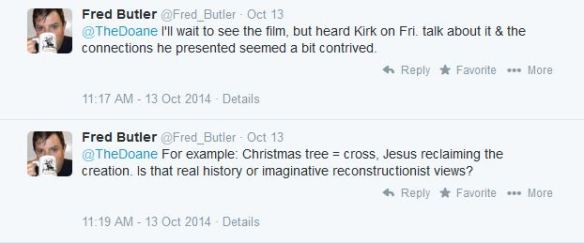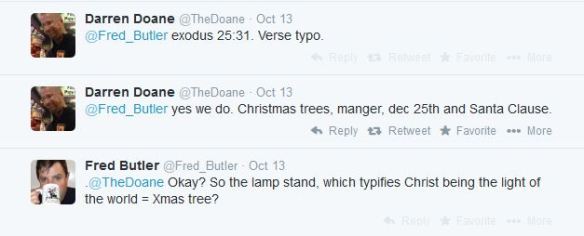So for the last few weeks, I have been tussling off and on with some strong critics of Kirk Cameron regarding an interview he gave to a Catholic radio program and the assertion that he is sliding into a slough of ecumenism. You can get the background to those sparring matches with this POST.
I highlighted in that post how Kirk has a movie coming out on the subject of our Christmas traditions called Saving Christmas. As you would expect, lot of the same folks who didn’t like Kirk’s Catholic show interview also have problems with his forthcoming film.
If you have seen the trailer, it tells about a guy who is all down on Christmas because he has been told by glum legalists that it was originally a pagan holiday that has become heavily commercialized and dishonoring to baby Jesus. Kirk plays the long suffering friend who walks the fellow through the true meaning of Christmas by evaluating each of the treasured Christmas traditions, like Christmas trees, why Christmas is on December 25th, and even Santa Claus. Just from the trailer, the movie does look like it will be fun.
Recently I had the opportunity to hear Kirk speak at my home church for an Institute for Creation Research conference. To be honest, I thought the bulk of his talk was disjointed and awkward. He seemed like he was only half-way prepared, as if he threw together some stuff at the last minute. It may be that he wasn’t on his game that night, so I don’t fault him too much.
At any rate, his session got a bit better as he moved into talking about the Gospel and Christ’s redemption of men and the world. That is when he spoke a bit on Saving Christmas. He did a great riff poking at folks who think Christmas is pagan and none of the Christmas traditions should be utilized in any serious fashion by Christians as a way to explain the Gospel.
He then moved into addressing Christmas trees and showed a clip from Saving Christmas that talked about how they represent the Second Adam, Christ, putting Himself on the tree of Calvary to pay for our sins. The lights somehow represented the light of the Spirit and the fact that Christmas is celebrated in December, during winter, which typifies death, adds emphasis to what Christ did when He died for sinners on the cross.
Afterwards, my friends and I were left scratching our heads. Did we just see what we saw? Basically a contrived allegorized reintepretation of Christmas trees as figures for Jesus on the cross? We were all like, “That. was. Interesting.”
Fast-forward to a few days later. I’m looking through my twitter feed when someone retweeted a tweet by a guy named Darren Doane who was responding to a Kirk Cameron dissenter who had tweeted him. He had this to say,
 I was familiar with the dissenter because I had interacted with the person at a previous time. However, when I checked Doane’s profile, it said he was THE filmmaker who made the last few Kirk Cameron movies/documentaries and the guy who wrote and directed Saving Christmas. He also plays the character in the film who is all down on Christmas. I thought, “Okay, here’s my chance to ask him, the writer/actor, about the contrived Christmas tree=cross idea Kirk presented.” And this is what our exchange looked like:
I was familiar with the dissenter because I had interacted with the person at a previous time. However, when I checked Doane’s profile, it said he was THE filmmaker who made the last few Kirk Cameron movies/documentaries and the guy who wrote and directed Saving Christmas. He also plays the character in the film who is all down on Christmas. I thought, “Okay, here’s my chance to ask him, the writer/actor, about the contrived Christmas tree=cross idea Kirk presented.” And this is what our exchange looked like:
The tendency of Reformed oriented guys these days is to “Christianize” culture or connect it to the Bible in some fashion so as to “Redeem it for Jesus.” They argue that Christ is Lord of all things and because He is Lord over all things, Christians can reclaim everything (though the primary focus is generally booze and movies or other forms of entertainment) by “redeeming” it. That is accomplished by redefining whatever it is you want to redeem according to some fanciful Reformed hermeneutic, which is okay to do because Jesus is sovereign over everything, so it’s His anyways. See how that works?
 I encountered that Reformed, “Jesus is Sovereign” hermeneutic once with a SBC pastor named Jared Moore. Pastor Moore, who is, by the way, a terrific fellow and all around good guy just so that you folks won’t get any wrong ideas about the man, wrote a book I reviewed called The Harry Potter Bible Study.
I encountered that Reformed, “Jesus is Sovereign” hermeneutic once with a SBC pastor named Jared Moore. Pastor Moore, who is, by the way, a terrific fellow and all around good guy just so that you folks won’t get any wrong ideas about the man, wrote a book I reviewed called The Harry Potter Bible Study.
You can check out my review, along with my rejoinder to a critical response he gave of my review to get more details, but in a nutshell, Pastor Moore claimed that the Harry Potter stories can teach us how to properly apply discernment with engaging our culture for Christ and the Gospel. He did that by drawing his readers to consider all of the spiritual “truths” found specifically in the last four Harry Potter films. Like they are the Chronicles of Narnia or something. And in case you need to know where I stand on the matter, I don’t believe there are spiritual “truths” to be gleaned from Harry Potter.
It is exactly what I see Doane suggesting with his tweets. Looking over his profile and considering the company he and Kirk are keeping these days, he is advocating his hermeneutic from a reconstructionist, postmillennial, theonomic perspective. The postmillenial reconstructionist vision believes God has appointed the Church to triumphantly spread the Gospel over all the earth. But it is much more than what is read in Matthew 28.
Accomplishing that victory entails subjecting all human authorities and institutions under the Lordship of Christ. One of the key strategies employed for completing that goal is reconstructing the culture according to God’s law as revealed in Scripture. In turn, that reconstructing of culture may include redefining our societal norms and reality along the lines of reconstructionist terminology, or in this case, hermeneutic.
So, take our Christmas tree for example: God assigned certain trees in Scripture with typological significance; i.e., Tree of Life, lampstand in the holy place, cross of Christ (called a “tree” by Peter in Acts 5:30). Hence, it is perfectly fine to utilize God’s typological hermeneutic regarding trees in the Bible in order to pour new meaning onto the Christmas tree, along with presents, the decorations, the lights, and even Santa Claus. In doing so, Christians are redeeming culture for the sake of Christ’s Lordship.
I have three problems with the reconstruction typological hermeneutic used in that manner:
1) God doesn’t desire to redeem things, like culture, or movies, or holidays. God redeems people. He desires to call men unto Himself, delivering them from His just wrath and fellowship with them forever. He accomplished that by Christ’s death on the cross.
Now certainly cultures will be impacted by redeemed people living in society. If a strip club owner gets saved, he shuts down the strip club. The same happens with any other element in society. But that is God changing people who then live godly among their neighbors. Think of John the Baptist’s words to his hearers in Luke 3:10-14.
2) I’ll develop this next point a little more when I do a fuller review of the film, but there is something dishonest with telling people the real meaning of Christmas trees, along with all the other festive trappings of Christmas, is now redefined according to this contrive hermeneutic. It is especially dishonest when you suggest to people that the new, imaginative meanings are biblical, derived from God’s Word, when in point of fact they are not. That is where a person begins to wander into David Barton territory claiming Thomas Jefferson was a Christian. Doane can argue all day long that God gave trees this meaning, but again that is dishonest because it doesn’t reflect the truth regarding the real history of Christmas trees. It also misleads those who hear his and Kirk’s promotion of this movie as having a biblical basis. God most certainly did not intend for us to make a type out of Christmas trees so as to “redeem culture.”
3) This reconstructionist hermeneutic does a great disservice to God’s Holy Word and borders on undermining the authority of Scripture. If a person feels, according to his eschatological outlook on the world, that he can play fast and loose with the types of Scripture, giving them newer meaning for the sake of “redeeming culture” that goes way beyond what God intended to convey, the floodgates are opened to the introduction of all sorts of theological error. It’s the same stuff we saw with neo-orthodoxy mangling the Bible.
Look: I disagree with my detractors who insist Kirk was putting his arms around Catholics in his interview on Busted Halo. I really have no problem with him, or even Doane, plugging their movie on various radio venues whether they be Christian or secular.
I do, however, have a serious problem with their reconstructionist revisionism that I am seeing played out, because this is where I see the crux of their debate with their critics. Those critics, I believe, have yet to identify the problem of their hermeneutic and if they are serious about engaging them accurately, they’ll sharpen their focus upon it.
[Contributed by Fred Butler, originally posted on his blog, Hip and Thigh]

















